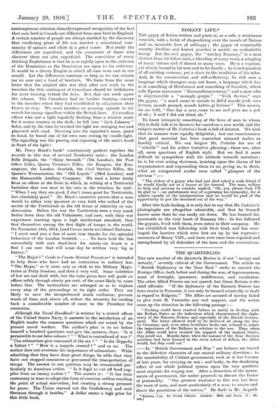ROMANY LINE.* THE gypsy of fiction-writers and poets is, as
a rule, a wearisome creature, with a habit of rhapsodizing over the moods of Nature
and an incurable love of soliloquy ; the gypsy of respectable country dwellers and honest parishes is merely an undesirable tramp. But the real gypsy, the " tatchey Romany," is a man distinct from his fellow-men, a blending of many races, a mingling . of many virtues and of almost as many vices. He is a vagrant, yet closely bound to his tent and to his family ; he is independent of all existing customs, yet a slave to the traditions of his tribe. And, in his conservatism and self-sufficiency, he still uses a language which strangers may not know, a language which has in it something of Hindustani and something of Sanskrit, which calls Epsom racecourse " Boronashemescrutan," and a man who is objectionable a " mumply gorgio." " Yeck divvus," says the gypsy, " a mush came to mande to dad mande yeck coro levinor, mande penned, mande kekko pi levinor." This means,
we are told, " One day a man came to me and gave me a pot of ale ; I said I did not drink ale."
To know intimately something of the lives of men to whom this is daily talk is to discover for ourselves a new world, and the subject-matter of Mr. Cuttriss's book is full of interest. We wish . that its manner were equally delightful ; but our consciousness that good material has been somewhat misused makes us harshly critical. We can forgive Mr. Cuttriss his use of " reliable " and his rather tentative phrasing—these are, after all, mere questions of English style. But we find it more difficult to sympathize with his attitude towards ourselves : he is for ever acting showman, insisting upon the charm of his acquaintances and expounding them to us, giving us, in short, what an exasperated reader once called " glimpses of the , obvious " :—
" The widow of a gypsy who had just died asked a male friend if he would kindly act as a bearer at the funeral. The man, willing to help and anxious to condole, replied, ` Oh, yes, please God, I'll be glad to '—an unfortunate way. of expressing his sympathy, for it admits equally of the interpretation that he would be glad of the opportunity to put the deceased out of the way."
After this fault-finding, it is only fair to say that Mr. Cuttrisa's photographs are altogether admirable, and that he himself
knows more than he can easily set down. He has learned the passwords to the very heart of Romany life : he has followed the gypsies, lived with them, even eaten in their company. He has established true fellowship with their kind, and has over- leaped the barriers which were first set up by the repressive measures of Henry VIII., and have ever since been repaired and strengthened by all defenders of the laws and the conventions.


















































 Previous page
Previous page